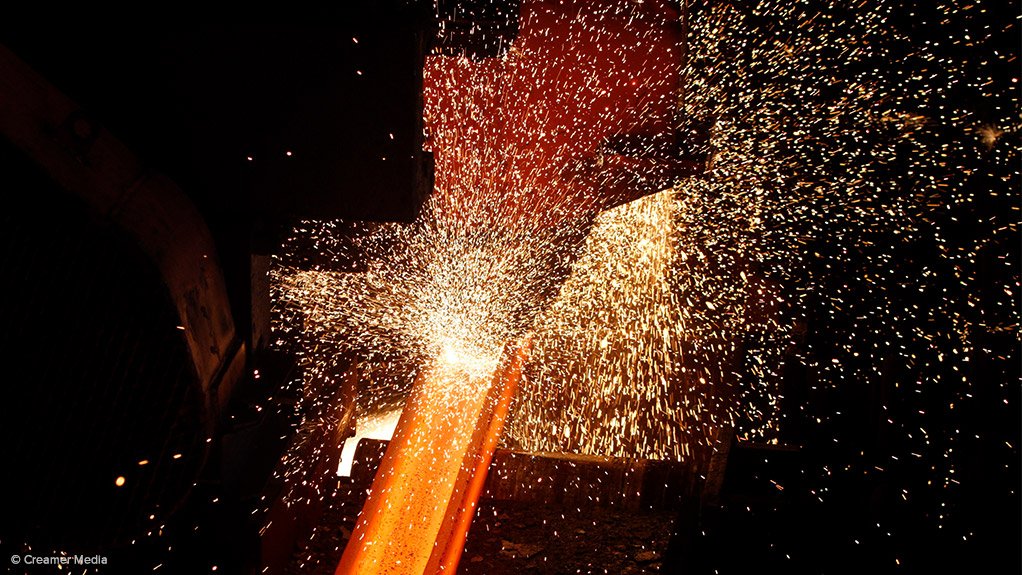Finding immediate steel alternatives a concern as AMSA prepares to wind down longs unit
ArcelorMittal South Africa (AMSA) has indicated that it will enter discussions with buyers of its noncommodity long-steel products in an effort to limit the disruption that is set to arise because of the closure of its longs operations in Newcastle, Vereeniging and eMalahleni.
Although demand for value- added products was insufficient to sustain an integrated mill such as Newcastle, where commodity products, such as rebar, make up a large portion of the one- million tons produced yearly, CEO Kobus Verster acknowledged that certain customers would face difficulties finding immediate substitute material.
This was confirmed by the Steel and Engineering Industries Federation of Southern Africa (Seifsa), which noted that downstream industries were heavily reliant on the long products that come from the three plants and that a switchover to new suppliers would “not happen overnight”.
“Even where these products can be imported, this will result in the exporting of jobs that are desperately needed in South Africa. Moreover, the logistics challenges facing the country raise serious questions whether port and rail infrastructure can get product to the end manufactures,” Seifsa said.
AMSA currently produces specific cross-ribbed flat bar, hollow- drill material and half-pipe sections, along with special profiles such as fish and tie plates, plough bars and mine-support bars, as well as a complete seamless-tube range and heavy-section material used in the rail industry.
In a briefing held following the group’s shock announcement that it would be winding down its long-products business – a move that has placed at risk 3 500 of the 9 942 full-time and contract jobs at the company – Verster said talks would now be held with affected customers.
Downstream producers of bright bars, springs, fasteners, agri-appliances, as well as some automotive and mining components potentially faced significant challenges in securing substitute material, particularly in the short term, with South African ports being heavily congested.
The discussions would focus primarily on gaining an understanding of the six-month demand profiles of affected businesses and assessing whether AMSA could adjust its wind-down processes to accommodate those firms.
However, Verster again indicated that the decision to close the longs business had been based on embedded structural factors that had made the business a serial lossmaker and a drain on the bigger group’s ongoing sustainability.
While costly and unreliable electricity and rail services were major aggravating factors, AMSA highlighted a chronic supply/demand imbalance, partly underpinned by a government policy geared towards increasing competition from producers using scrap as an input.
The imbalance was initially expected to be addressed on the back of a long-promised increase in infrastructure investment, which never materialised. Local long-products production capacity is currently estimated by AMSA at about four-million tons, but demand was currently below two-million tons.
“Our longs business has only made a profit twice over the past seven years,” Verster pointed out.
Seifsa also attributed some of the blame for the planned closures on policy, stating that the “preferential pricing system for scrap, a 20% export duty and more recently a ban on scrap exports have all played a major role in contributing to the current state of affairs”.
“Seifsa has repeatedly warned that the decisions relating to the scrap metal policy and its industrial policy consequences will yield casualties.
What we are seeing unfolding at ArcelorMittal feeds directly into these warnings,” the organisation said.
If called for the related scrap and industrial policy issues to be urgently escalated to the Economic Cluster of Ministries, arguing that the Department of Trade, Industry and Competition “seemingly does not have the capacity nor the grasp of the broader implications of these developments”.
“The matter is now beyond urgent and we urge the President and key Ministers in the Economic Cluster to treat it as such, if we are to avoid a socioeconomic catastrophe of gigantic proportions in the metals and engineering industry which will reverberate throughout the economy and the continent, impacting the auto, motor, construction and mining subsector of the economy and all who work in it,” Seifsa said.
Besides employees and some downstream customers, the KwaZulu-Natal town of Newcastle is set to feel the wind-down pain most acutely.
Some 2 280 of the 3 500 jobs at risk are located at the Newcastle mill, which has been a dominant feature of the local economy for decades.
Made up of 1 400 direct employees and 880 contractors, the figure does not include those workers associated with the facility’s coke batteries, which will continue, and potentially increase production post the wind down.
Article Enquiry
Email Article
Save Article
Feedback
To advertise email advertising@creamermedia.co.za or click here
Press Office
Announcements
What's On
Subscribe to improve your user experience...
Option 1 (equivalent of R125 a month):
Receive a weekly copy of Creamer Media's Engineering News & Mining Weekly magazine
(print copy for those in South Africa and e-magazine for those outside of South Africa)
Receive daily email newsletters
Access to full search results
Access archive of magazine back copies
Access to Projects in Progress
Access to ONE Research Report of your choice in PDF format
Option 2 (equivalent of R375 a month):
All benefits from Option 1
PLUS
Access to Creamer Media's Research Channel Africa for ALL Research Reports, in PDF format, on various industrial and mining sectors
including Electricity; Water; Energy Transition; Hydrogen; Roads, Rail and Ports; Coal; Gold; Platinum; Battery Metals; etc.
Already a subscriber?
Forgotten your password?
Receive weekly copy of Creamer Media's Engineering News & Mining Weekly magazine (print copy for those in South Africa and e-magazine for those outside of South Africa)
➕
Recieve daily email newsletters
➕
Access to full search results
➕
Access archive of magazine back copies
➕
Access to Projects in Progress
➕
Access to ONE Research Report of your choice in PDF format
RESEARCH CHANNEL AFRICA
R4500 (equivalent of R375 a month)
SUBSCRIBEAll benefits from Option 1
➕
Access to Creamer Media's Research Channel Africa for ALL Research Reports on various industrial and mining sectors, in PDF format, including on:
Electricity
➕
Water
➕
Energy Transition
➕
Hydrogen
➕
Roads, Rail and Ports
➕
Coal
➕
Gold
➕
Platinum
➕
Battery Metals
➕
etc.
Receive all benefits from Option 1 or Option 2 delivered to numerous people at your company
➕
Multiple User names and Passwords for simultaneous log-ins
➕
Intranet integration access to all in your organisation





















